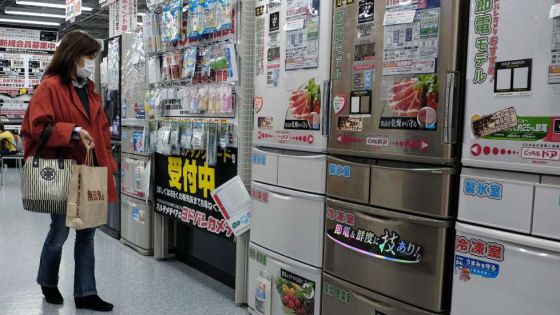
A woman in a department store in Tokyo. / EFE
Falling Japanese economy during the third quarter was higher than initially estimated. The final data released Monday by the Government, say the third world economy contracted by 0.5% in the third quarter -or an annualized rate of 1.9% – compared with 0.4% -1.6% anualizado- estimated that just three weeks ago. The data confirms the country’s fourth recession since 2008 to build two quarters of consecutive declines after that between April and June, the economy contracted by 1.9% due to the impact of the VAT hike.
The downward revision was due to lower spending by businesses and the public sector, while domestic consumption, the largest component of GDP Japan accounting for 60% of the total, was unchanged compared to the initial estimate ( rose a modest 0.4%).
The red numbers in Japan are justified by the VAT hike last April, which rose from 5% to 8%. The tax increase consumption sank during the following months, many citizens had advance purchases before the imminent increase in prices-and the economy longer than expected suffered. The entry into recession and political strategy led to Prime Minister Shinzo Abe, to defer a year and half the next higher taxes, which aumenbtará the tax rate to 10%, and early elections to endorse their economic policy. The elections will be held on Sunday with the expectation that Abe revalidate their support in the polls and win a large majority.
It seems, however, that this recession will not last much longer. Monthly indicators on business confidence, investment or trade show a slight improvement. Today we learned that the country recorded a surplus on current account for the fourth month through higher investment abroad by the depreciation of the yen. The trade balance remained in deficit despite exports rose 11.2 percent year on year.
“We believe that economic recovery will be confirmed from the fourth quarter onwards, as the circle between production, revenues and expenses remains intact and the prospects are good, “predicts research service bank Nomura. Investors also reacted to the last pothole. Half-time the Tokyo Stock Exchange rose a meager 0.01% after momentarily exceed 18,000 points, a threshold not reached since July 2007
Ongoing falling value of the yen and oil prices also increase the chances that Japan comes sooner than later recession. Moreover, markets are confident that Abe will get a new majority on Sunday and will continue with the Abeconomía, Prime Minister’s strategy to revive the Japanese economy based on increased government spending, monetary stimulus and structural reforms.
“The increased expenditure in the form of a supplementary budget in 2014 and the recent extension of the stimulus program of the Bank of Japan, by the postponement of tax increases, boost the economy,” says the report from Nomura. Analysts agree, however, that these Keynesian policies must be accompanied by greater decision when to push the structural reforms that help reduce public debt, which is almost 240% of GDP and is a major threat to the health of public finances. Some changes for Abe needs time, left hand and power, try to get something on Sunday.
No comments:
Post a Comment